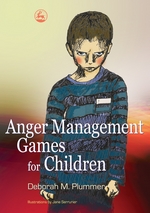 by Deborah M. Plummer
by Deborah M. Plummer
This practical handbook helps adults to understand, manage and reflect constructively on children's anger. Featuring a wealth of familiar and easy-to-learn games, it is designed to foster successful anger management strategies for children aged 5-12.
Full Description:
This practical handbook helps adults to understand, manage and reflect constructively on children's anger. Featuring a wealth of familiar and easy-to-learn games, it is designed to foster successful anger management strategies for children aged 5-12. The book covers the theory behind the games in accessible language, and includes a broad range of enjoyable activities: active and passive, verbal and non-verbal, and for different sized groups. The games address issues that might arise in age-specific situations such as sharing a toy or facing peer pressure. They also encourage children to approach their emotions as a way to facilitate personal growth and healthy relationships. This is an ideal resource for teachers, parents, carers and all those working with anger management in children. 'Deborah Plummer uses imagination and empowerment to move children and adults from discouragement to success.'
- The Canadian Child and Adolescent Psychiatry Review 'Deborah Plummer shows a fundamental respect for a child's integrity whilst making sure her language and ideas accessible to a wide range of people.'
- Afasic News Deborah M. Plummer is a registered speech and language therapist and imagework practitioner with over 20 years' experience of facilitating groups and working individually with both children and adults. Formerly a clinical lead therapist working within the NHS, she now lectures at De Montfort University, Leicester and runs workshops and short courses on the uses of imagery and issues of self-esteem.
246mm x 173mm / 10in x 7in, 160pp
ISBN:
Part One: Theoretical and Practical Background. 1. Introduction. 2. Understanding Anger 3. Why Use Games to Support Healthy Anger Management? 4. Structuring the Emotional Environment. 5. When a Child is Already Angry. 6. Self-Reflection and Self-Care. Bibliography. References. Part Two: Games for Anger Management. 7. Non-Competitive Ways to Choose Groups and Group Leaders. 8. Warm-Ups and Ice-Breakers. 9. Lighting the Fuse: Exploring Anger and Triggers to Anger. 10. When I'm Angry: Responses and Consequences. 11. You and Me: Empathy. 12. You and Me Together: Respect, Cooperation and Negotiation. 13. In the Driving Seat: Being in Control, Managing Stress and Tolerating Frustration. 14. Got It! Solving Problems. 15. Off We Go: Setting Goals and Being Prepared. 16. Wind Downs and Celebrations. Useful Resources. Index.
Stock: Usually ships in 8-10 business days!
|